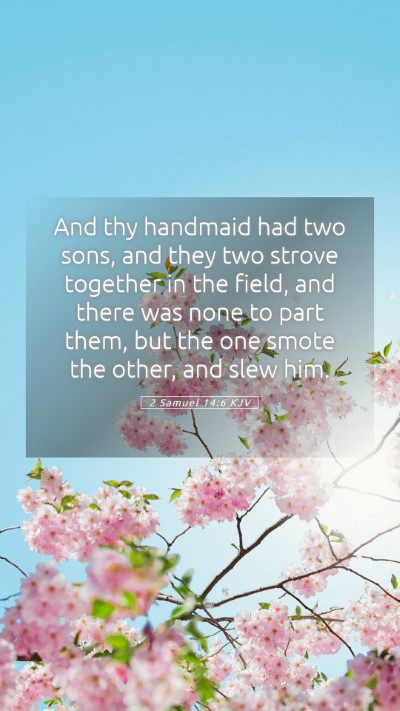2 Samuel 14:6 - Bible Verse Meaning and Commentary
In 2 Samuel 14:6, the context involves a significant interaction where a woman from Tekoa approaches King David to plead for her son. The verse captures themes of family conflict, reconciliation, and the complexity of human relationships. Below, we will explore the deeper meanings and interpretations of this verse from respected public domain commentaries, including insights from Matthew Henry, Albert Barnes, and Adam Clarke.
Verse Text
"And thy handmaid had two sons; and they strove together in the field, and there was none to part them: but the one smote the other, and killed him." - 2 Samuel 14:6
Summary of Commentary Insights
-
Matthew Henry:
Henry emphasizes the desperation of the mother as she recounts her plight, highlighting the tragic nature of familial strife and the need for intervention. The story symbolizes broader societal issues, pointing to the nature of conflict and the hope for reconciliation through the authority of the king.
-
Albert Barnes:
Barnes elaborates on the emotional appeal of the woman, suggesting that her story is crafted to resonate with David's own experiences and struggles. The death of one son at the hands of another reflects the gravity of sin and its consequences, implicating the need for justice tempered with mercy.
-
Adam Clarke:
Clarke provides historical context, discussing the cultural implications of the woman’s plea and the societal norms regarding justice in Israel. He points out the way this interaction foreshadows David's later struggles with his own family, emphasizing the need for compassion in governance.
Key Themes
-
Conflict and Reconciliation:
The verse encapsulates the challenges of conflict between family members and the desire for reconciliation, which is a central theme throughout scripture.
-
Justice and Mercy:
David’s reaction to the woman's plea introduces the tension between justice and mercy, essential concepts in biblical teachings. The narrative illustrates how leaders must navigate these often opposing demands.
-
Human Relationships:
The dynamics presented reveal the complexities inherent in human relationships and parenting, resonating with readers who seek to understand how to apply biblical teachings to their own lives.
Cross References
- Genesis 4:8: The story of Cain and Abel, showcasing the seriousness of sibling rivalry and conflict.
- 2 Samuel 13:28-29: The tale of Amnon and Absalom which illustrates the painful outcomes of family discord.
- Proverbs 20:3: Advises on how to avoid strife and conflict, promoting peace.
Application of the Verse
2 Samuel 14:6 offers profound teachings that can be applied to our lives today. Conflicts within families are common, and this verse encourages us to seek understanding and resolution rather than letting disputes escalate. It also prompts us to remember the importance of a governing authority's role in fostering peace and addressing conflicts with wisdom and compassion.
Conclusion
In exploring the meaning of this Bible verse, we are reminded of the timeless struggle within families and the need for reconciliation. The insights provided by respected commentators highlight the importance of understanding scripture in its historical context, as well as its application to modern relationships. Whether through personal Bible study or shared insights in Bible study groups, the teachings in 2 Samuel 14:6 can guide us towards better understanding and resolution of our conflicts.


